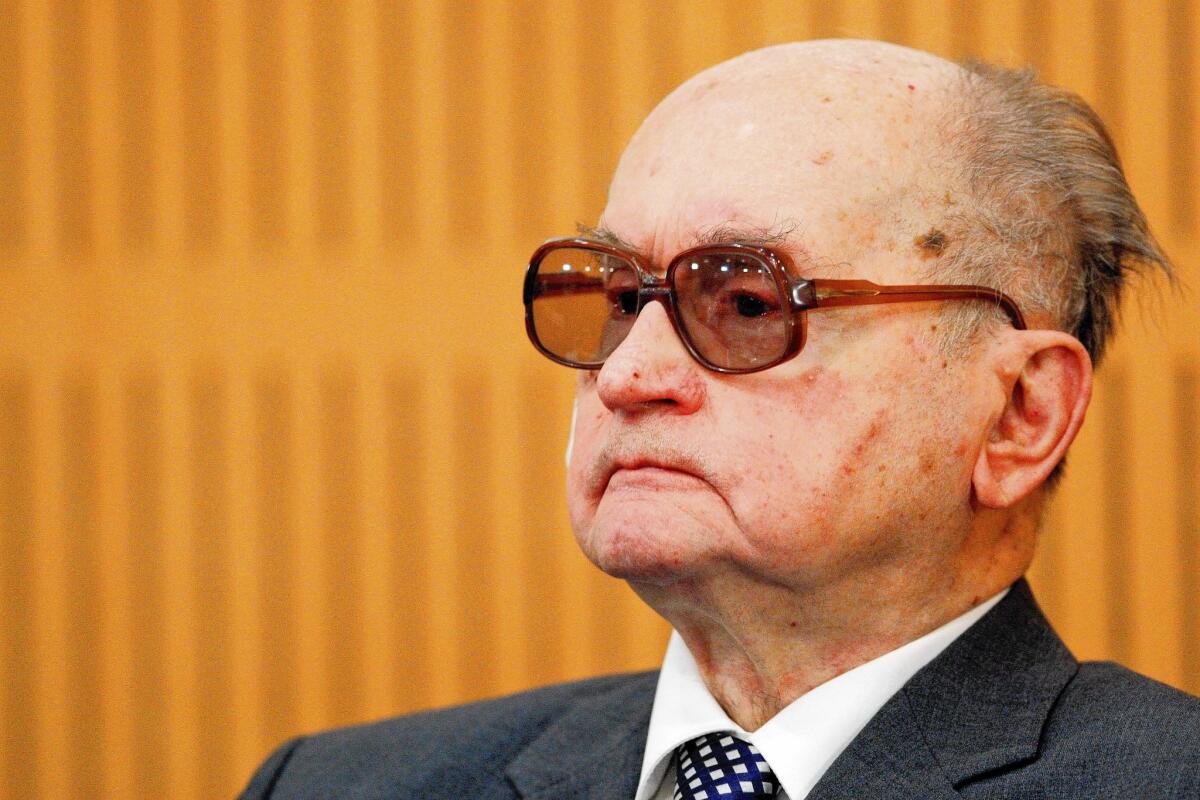Wojciech Jaruzelski dies at 90; Polish general imposed martial law

- Share via
Reporting from Warsaw — Gen. Wojciech Jaruzelski, the communist leader who imposed harsh military rule on Poland in 1981 in an attempt to crush the pro-democracy Solidarity movement but years later allowed reforms that ended up dismantling the regime, has died. He was 90.
Jaruzelski, who suffered in recent years from cancer, heart problems and pneumonia, died Sunday in a Warsaw hospital after suffering a stroke this month, hospital spokesman Grzegorz Kade said.
Jaruzelski died just days before Poland marked 25 years since the crucial parliamentary election in which Poles voted against the country’s communist rulers and in support of the Solidarity freedom movement.
The retired general remained a controversial figure in his homeland until the end of his life for his defining act: the imposition of martial law that began at dawn on Dec. 13, 1981.
The suppression of the democracy movement resulted in the mass imprisonment of thousands of dissidents, the deaths of dozens, and economic stagnation that contributed to the system’s eventual undoing. It also pushed many Poles to flee the country and seek exile in the West.
Jaruzelski was an unlikely servant to Moscow and its communist ideology. Born in 1923 into a patriotic and Catholic Polish milieu of privileged landowners, he and his family were deported to Siberia by the Red Army during World War II. His father died there and Jaruzelski suffered snow blindness, which forced him to wear dark glasses to the end of his life.
Despite his own tragedy at Soviet hands, he faithfully imposed Moscow’s will on his subjugated nation until communism crumbled across the region in 1989.
For 18 months, Poles lived with curfews, dead phone lines and armed troops and tanks on the streets. Nearly 100 people died during the crackdown, while tens of thousands of Solidarity activists were imprisoned, including future presidents Lech Walesa — the Solidarity leader — and Lech Kaczynski.
Yet Jaruzelski, who headed the government from 1981-85 and the party from 1981 until the communist regime’s collapse in 1989, repeatedly defended his decision. “The greater evil would have been a [Soviet] intervention,” he said in a 2005 interview.
In 1943, after his family had been deported to Siberia, Jaruzelski entered a training school for Russian officers and fought the Nazis in a Soviet-backed Polish army. When Warsaw rose up against its Nazi occupiers in 1944, Jaruzelski and fellow soldiers from the Polish People’s Party sat with the Soviet Army across Warsaw’s Vistula River, doing nothing for more than two months as the Nazis killed more than 250,000 people and leveled the city.
He joined the communist party and quickly rose through army ranks to become chief of the general staff in 1965. As defense minister, Jaruzelski was one of the Warsaw Pact generals who planned the invasion of Czechoslovakia to crush the peaceful 1968 pro-democracy uprising. In 1970 he carried out orders to suppress workers’ revolts in Gdansk and other coastal cities, a campaign that left 44 people dead and hundreds injured.
He became general secretary of the Communist party and prime minister in 1981, when Walesa’s Solidarity movement was enjoying mass popularity, often expressed through strikes.
After the transition to democracy, he argued that he should ultimately be judged by his role in peacefully negotiating a power-sharing arrangement with Solidarity.
His foes, however, held on to their view of him as a traitor.
He is survived by his wife Barbara, daughter Monika and a grandson.
Gera writes for the Associated Press.
More to Read
Start your day right
Sign up for Essential California for the L.A. Times biggest news, features and recommendations in your inbox six days a week.
You may occasionally receive promotional content from the Los Angeles Times.






